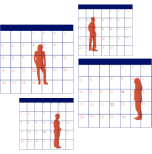
Reimagining Our Criminal Legal System
Extreme and excessive sentencing practices have come to define the American criminal legal system, driving mass incarceration to a globally and historically unprecedented scale. These practices are rooted in racism, are extremely costly, and do not make us safer. We’re fighting back.

Reimagining Our Criminal Legal System
Extreme and excessive sentencing practices have come to define the American criminal legal system, driving mass incarceration to a globally and historically unprecedented scale. These practices are rooted in racism, are extremely costly, and do not make us safer. We’re fighting back.

Colorado’s prison population and budget have exploded in recent years.
Here are just a few of the numbers:
554%
The rate at which the Colorado prison population has grown since 1980.
1288%
The rate at which Colorado’s state prison budget has grown over 35 years.
28%
The percentage of Colorado’s prison population serving sentences in excess of 40 years, including life sentences.
35%
of people serving life without parole sentences in Colorado are over the age of 50.
60%
of those serving life sentences in Colorado are Black or Latinx.
18%
of Colorado’s prison population is Black, even though African-Americans comprise only 4.6% of the state population.
We Believe

Permanent Punishment is Inhumane
A death sentence declares a person to be fundamentally irredeemable based solely on their worst act. Sentencing a person to a term of imprisonment without any meaningful opportunity for release sends the same message. Like the death penalty, death-in-prison sentences undermine human dignity and are out of step with sentencing practices in most other parts of the world.
Extreme Punishment Has an Outsized Impact on People of Color
The racial bias which characterizes the criminal legal system as a whole puts people of color at greater risk of receiving an extreme sentence. For example, Black Americans are incarcerated in state prisons at a rate of nearly 5 times that of white Americans.
Excessive Sentencing Policies are Driven by Fear, Not Facts
Research shows that violence is frequently driven by factors such as trauma, abuse, neglect, and mental illness. Yet politicians and the media often embrace narratives that ignore these complexities and assume that people who commit acts of violence are irredeemable, leading to overly harsh sentencing laws that fail to meaningfully reduce crime. Dismantling these false narratives is critical to changing these ineffective policies.
No One is Beyond Change
No one should be defined by their worst act. Every person is capable of growth and change. We will not meaningfully address mass incarceration by enacting reforms that focus solely on the “low-hanging fruit.” Inclusive approaches to sentencing reform—those that do not categorically exclude large segments of the prison population—are necessary in order to meaningfully address the problem of mass incarceration.

Permanent Punishment is Inhumane
A death sentence declares a person to be fundamentally irredeemable based solely on their worst act. Sentencing a person to a term of imprisonment without any meaningful opportunity for release sends the same message. Like the death penalty, death-in-prison sentences undermine human dignity and are out of step with sentencing practices in most other parts of the world.

Extreme Punishment Has an Outsized Impact on People of Color
The racial bias which characterizes the criminal legal system as a whole puts people of color at greater risk of receiving an extreme sentence. For example, Black Americans are incarcerated in state prisons at a rate of nearly 5 times that of white Americans.

Excessive Sentencing Policies are Driven by Fear, Not Facts
Research shows that violence is frequently driven by factors such as trauma, abuse, neglect, and mental illness. Yet politicians and the media often embrace narratives that ignore these complexities and assume that people who commit acts of violence are irredeemable, leading to overly harsh sentencing laws that fail to meaningfully reduce crime. Dismantling these false narratives is critical to changing these ineffective policies.

No One is Beyond Change
No one should be defined by their worst act. Every person is capable of growth and change. We will not meaningfully address mass incarceration by enacting reforms that focus solely on the “low-hanging fruit.” Inclusive approaches to sentencing reform—those that do not categorically exclude large segments of the prison population—are necessary in order to meaningfully address the problem of mass incarceration.
Our Three-Pronged Approach to Combating Excessive Sentencing

Individual Case Work
We assist individuals serving life or virtual life sentences in the State of Colorado.
Learn More
Advocacy and Policy
We engage in strategic litigation and advocate for policies that will end excessive sentences, reduce the prison population and expand second chances for incarcerated individuals.
Learn More
Changing Narratives
As we work to change the law, we also work to change the prevailing false, dehumanizing narratives about people in prison that inform the racist, extreme sentencing policies and practices that have led to mass incarceration.
Learn MoreOur Three-Pronged Approach to Combating Excessive Sentencing

Casework and Direct Support
We assist serving life or virtual life sentences in the State of Colorado.
Learn More
Advocacy and Policy
We engage in strategic litigation and advocate for policies that will end excessive sentences, reduce the prison population and expand second chances for incarcerated individuals.
Learn More
Changing Narratives
As we work to change the law, we also work to change the prevailing false, dehumanizing narratives about people in prison that inform the racist, extreme sentencing policies and practices that have led to mass incarceration.
Learn MoreGet Involved
Sign up for our email list to receive updates on our work
